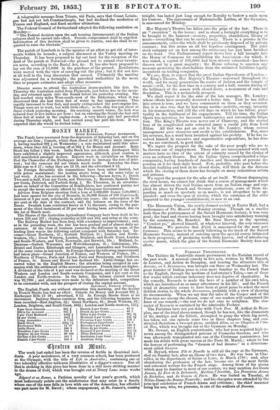Her Majesty's Theatre has fallen into the gripe of the
law. There is an "execution" in the house ; and in about a fortnight everything is to be brought to the hammer—scenery, properties, chandeliers, library of music—everything that can be carried away. There is a proviso in the announcement, unless the whole shall be previously disposed of by private contract; but this seems an all but hopeless contingency. The joint stock company set on foot among the aristocracy has just been knocked on the head. Our Parliamentary report shows that a bill brought into the House of Commons for establishing the Association—for which, it was stated, a capital of 198,0001. had been already subscribed—has been thrown out by a great majority; the House refusing to sanction any measure protecting the shareholders from the unlimited liabilities legally incumbent on trading companies. We are, then, to expect that the great Italian Operahouse of London— the Ring's Theatre, Her Majesty's Theatre—renowned throughout the world, and for many generations the centre of fashion and the temple of music—will, for the first time in a century and a half; remain during all the brilliancy of the season with closed doors, a monument of ruin and desolation. This is a melancholy prospect.
We shall regret it for the sake of the late manager, Mr. Lumley ; whose efforts have assuredly deserved a better fate. That he has fallen into errors is true, and we have commented on them as they occurred. But it is also true that he had many merits—activity, energy, integrity in his transactions and (till the evil days on which he has fallen) punc- tuality in the fulfilment of his engagements. Till his time, the Italian Opera was notorious for incessant bankruptcies and interminable litiga- tion. The King's Theatre was never out of Chancery, and the eternal bore of its complicated suits extracted many a rueful joke from Lord Eldon. All that was put an end to by Mr. Lumley, whose correct management gave character and credit to the establishment. Nor, since his reverses, has a word been breathed against his probity. If he has in- volved himself in excessive and unproductive expenditure, he has done so, we are convinced, in good faith. We regret the prospect for the sake of the poor people who are to be thrown out of employment. Those who are unacquainted with such matters have no idea of the extent of calamity caused by the closing of even an ordinary theatre. But the Italian Opera comprehended a large community, having hundreds of families and thousands of persons de- pending on it for their daily bread. Few, probably, who pass before the desolate building and look at its closed doors, will think on the distress which the closing of those doors has brought on many industrious artists. and artisans.
We regret the prospect for the sake of art itself. Without disparaging the rival house' we cannot but think that a course of management which has almost driven the real Italian opera from an Italian stage and sup- plied its place by French and German productions, some of them de- pending as much on spectacle as on music, is not altogether to be ap- plauded: and even the spur of rivalry, which the existence of the elder imparted to the younger establishment, is now at an end.


























 Previous page
Previous page